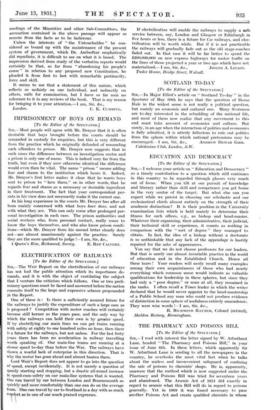ELECTRIFICATION OF RAILWAYS
[To the Editor of the SPECTATOR.] Sm,—The Weir Report on the electrification of our railways has not had the public attention which its importance de- mands, and it is with the object of ventilating the subject that I venture the criticism which follows. One or two preli- minary questions must be faced and answered before the nation commits itself to the large and expensive scheme propounded in the Report.
One of these is : Is there a sufficiently assured future for the railways to justify the expenditure of such a large sum as is proposed ? Competition with motor coaches will certainly become still keener as the years pass, and the only way by which the railways can hold their own is by greater speed. If by electrifying our main lines we can get trains running with safety at eighty to one hundred miles an hour, then there is a future for the railways, but not unless. For the last forty years there has been no acceleration in railway travelling worth speaking of. Our main-line trains are running at a slower speed to-day than before the War. The railways have shown a woeful lack of enterprise in this direction. That is why the motor has gone ahead and almost beaten them.
Lord Weir's Report does not appear to go into the question of speed, except incidentally. It is not merely a question of speedy starting and_ stopping, but a drastic all-round increase in speed-cum-safety on our main-line systems that is wanted. One can travel• by car between London and Bournemouth as quickly and more comfortably-than one can do on the average train. One can travel by car to Scotland in a day with as much covifort as in one of our much praised expresses.
If electrification will enable the railways to supply a safe service between, say, London and Glasgow or Edinburgh in five hours or less, there is a future for Cie railways, and elec- trification will be worth while. But if it is not practicable the railways will gradually fade out as the old stage-coaches faded out. In that case it will be far better to spend the £260,000,000 on new express highways for motor traffic on the lines of those projected a year or two ago which have not materialized.—I am, Sir, &c., JOSEPH A. LECKIE. Tudor Rouse, Bridge Street, Walsall.






































 Previous page
Previous page